Dental Implants – Lancaster, PA
A Second Chance For a Permanent Smile

At Dentistry for Life, we believe in providing advanced dental services to our dentistry patients suffering from tooth loss. No matter the number of teeth that are missing, dental implants are a stronger and more natural way to rebuild and restore your smile and ability to eat and speak with greater ease. With the help of dental implants from our Lancaster, PA dentist, not only do we replace the visible crown/tooth, but also the root. An added benefit of dental implants is bone stabilization, preventing additional jaw bone loss. Call our dental team today to schedule an exam to determine your candidacy for dental implants.
Why Choose Dentistry for Life for Dental Implants?
- In-House Dental Implant Placement & Restoration
- CT/Cone Beam Scanner for Accurate Treatment Planning
- No-Mess Digital Impression System
What are Dental Implants?

Dental implants are considered a superior form of tooth replacement because they consist of titanium, screw-like posts that fuse with the jawbone to create a solid foundation for new teeth. Mimicking the natural root-to-crown structure, they remain firmly in place and can last 30+ years or longer with optimal maintenance. Not to mention, they look and feel natural, making them the preferred choice for millions of Americans who once suffered from tooth loss.
Dental Implants in Conjunction with Dentures or Partial Dentures

Some patients find they can function better with a denture or partial denture when there are dental implants under their existing denture to help secure their denture and give them greater confidence when eating and speaking. This allows many of our patients to return to a more normal lifestyle free from a limited diet and awkward social encounters.
The 4-Step Dental Implant Process

We are able to offer start-to-finish dental implant treatments, which means that we will handle everything from the surgery for placing the implant posts in your jaw to the delivery of your beautiful replacement teeth. To make sure that you are fully prepared, we encourage you to learn more about the dental implant process, which can slightly vary from patient to patient depending on the circumstances but can generally be divided into four main steps as detailed below.
Initial Dental Implant Consultation
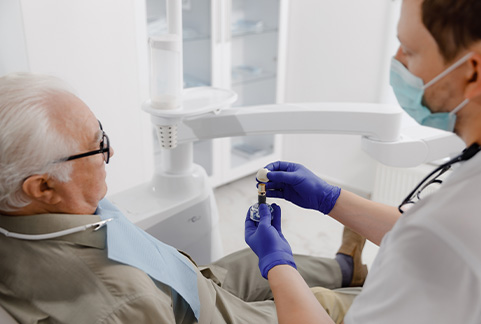
The initial consultation is meant to help answer a simple question: will you be able to get dental implants? We’ll need to evaluate the health of your mouth and the level of bone density in your jawbone before we can confirm whether you’re a viable dental implant candidate. Bear in mind that in some cases, you may need to have preliminary work done before you can get dental implants. This may include bone grafting, tooth extractions, or gum disease treatment.
Dental Implant Surgery

We want you to be able to stay as comfortable as possible during your dental implant surgery. As such, a local anesthetic will be used to ensure that discomfort is kept to a minimum. We know some patients may require extra help to stay calm during their surgery, which is why we offer dental sedation as well.
When the dental implant surgery begins, incisions will be made in your gums so that we can work with the underlying bone. The appropriate number of implant posts will be inserted into your jaw in precisely chosen locations. Then the gums will be closed with sutures. Special caps will be attached to the implant posts to protect them during the recovery process; they will also help ensure that the gum tissue maintains the correct shape.
Dental Implant Osseointegration & Abutment
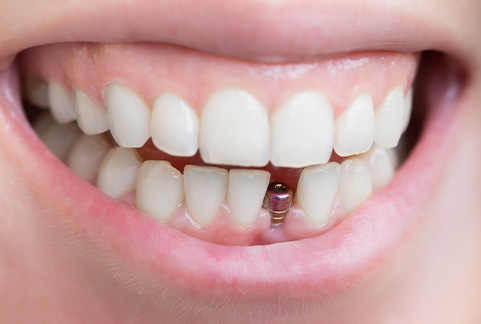
After dental implant surgery, the implant posts will gradually fuse with your jawbone. This is called osseointegration, and it is necessary for making sure that your dental implants stay firmly in place in your jaw. Osseointegration usually takes about three to six months; our team will give you instructions for taking care of your mouth during this period.
After osseointegration, it will be time to place abutments on the implant posts. Abutments are connector pieces made out of metal. They will eventually perform the vital task of keeping your new teeth secured to the dental implants.
Delivery of Dental Implant Restoration(s)
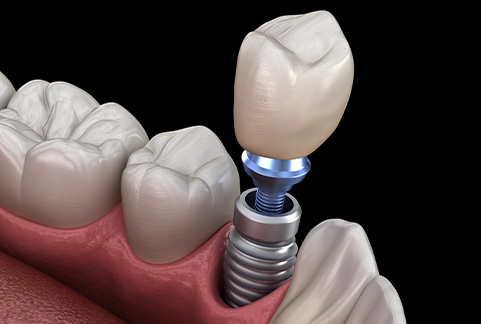
After impressions of your mouth are taken, your final crown, bridge, or denture can be designed and created. Once the final prosthesis is complete, we’ll schedule one last appointment to attach it to your dental implant posts. Remember, your new teeth will be carefully customized with your unique mouth in mind, leaving you with a confident and natural-looking new smile.
Benefits of Dental Implants

Dental implants have a variety of benefits that they offer that makes them a top choice among patients looking to replace any number of missing teeth. From the short-term oral health advantages they provide to their unmatched lifespan and natural look and feel, it’s no wonder why so many patients who are looking for the best tooth replacement option in Lancaster choose dental implants. Learn more about the many benefits of dental implants below.
Day-to-Day Benefits

Your teeth are a critical to your everyday functioning, whether you’re eating food to fuel your cells or communicating with your friends, family, or neighbors, your teeth are an important component of your body. Because dental implants are able to restore your smile to its natural look and function, you’ll be able to take advantage of a number of day-to-day benefits, including:
- Easy Maintenance: Dental implants are permanently attached within your mouth, meaning you won’t have to worry about taking them out to brush them or soaking them overnight in water. Instead, just care for them as you would your natural teeth, by brushing twice a day, flossing daily, and visiting your dentist every six months for checkups and cleanings.
- Major Confidence Boost: With enhanced stability compared to traditional dental restorations as well as a lifelike appearance, your implant restorations will help you feel more confident in your daily life.
- Eat All of Your Favorite Foods: You don’t have to feel anxious about eating the mouthwatering steak sitting in front of you or a crusty, fresh-baked piece of bread that you’re craving because your dental implants restore up to 80% of your original bite power!
Health Benefits

Having a complete and functional smile that you feel proud to let show also has a number of benefits to your health:
- Improved Overall Health: Studies show that living with missing teeth can lead to an increased risk of developing oral and overall health problems. With a complete and functional smile, you won’t just be taking care of your mouth, but also the rest of your body.
- Preservation of Jawbone Structure: Even if you opt to restore your smile with a traditional bridge or dentures, these options don’t replace the missing root structures of your teeth like dental implants do. Because of this, your jawbone will deteriorate over time due to a lack of stimulation and blood flow, ultimately impacting your facial shape. Because dental implants naturally fuse with the jawbone, they’re the only tooth replacement solution that prevents jawbone loss from occurring.
Long-Term Benefits

There are several long-term benefits of dental implants in Lancaster, but one of the most notable is the fact that, with proper maintenance, dental implants have a 95 percent success rate after 10 years and have been shown to last for up to 35 years. This is three times longer than any traditional restorative treatment.
Dental Implant Failure & Salvage

While dental implants have an impressive success rate of over 95% even ten years after being placed, there are some cases where one of these devices comes loose or falls out. The team at Dentistry for Life is trained and equipped to provide dental implant failure and salvage services to ensure that your restored smile stays in great shape, so contact our office in Lancaster if you’re worried about the wellbeing of your artificial teeth.
Learn More About Dental Implant Failure & Salvage
Who Dental Implants Can Help

Most adults who face tooth loss are capable of receiving dental implants. The differentiator between those who are given the green light immediately versus those who are not is whether preliminary treatments are needed. For those who require bone grafting, periodontal therapy, or even tooth extraction, the hope of dental implants remains a possibility, no matter how many teeth are missing.
Missing One Tooth

Replacing a single tooth only requires one dental implant, one custom abutment, and an implant crown. This will make eating and speaking much easier, and it will allow you to feel more confident in your appearance.
Missing Multiple Teeth

If multiple missing teeth need to be replaced, we can place multiple dental implants and fabricate an implant bridge or a fixed or removable partial denture.
Missing All of Your Teeth

An entire arch of missing teeth can now be replaced using implant retained dentures. Using between four and six implants, implant retained dentures allow for a customized prosthetic with attachments that snap onto attachments on the implants, giving you greater stability than that of a traditional denture.
Understanding the Cost of Dental Implants

Understanding the cost of any dental treatment can be difficult, but it doesn’t have to be impossible! While many different factors affect the price of dental implants, we can give you a sense of what expenses might be involved – as well as how you could save money. For a more specific number, we recommend scheduling a consultation with Dr. Frank or Dr. Nellie. After examining your mouth and reviewing your health history, they’ll have a much better idea of what you’ll need and will be able to give you a more accurate quote.
In the meantime, if you have any questions or concerns, don’t hesitate to reach out to our friendly team for answers!
Preliminary Treatments & Dental Implant Surgery

Preliminary treatments include any procedures you might need to promote the success of your implants. For instance, if you have gum disease, we’ll recommend treating the condition beforehand so your implants will have strong, healthy support.
Dental implant surgery is a separate cost from the placement itself. Usually the location of your treatment and what anesthetics are involved affect this price. Fortunately, our skilled dentists can perform the surgery in-office at Dentistry For Life, meaning you won’t have to worry about receiving statements from multiple practices.
The Parts of Your Dental Implant

Apart from your oral health and dental implant surgery, the individual implants can also influence your final total. Here’s what we mean:
- The number of implants will greatly affect your treatment price; more implants means more expenses.
- Different types of implant restorations vary in cost. An implant retained denture, for example, won’t be the same price as a dental implant crown.
- Implant material also makes an impact. Though most dental implant posts are made from titanium, other options, like zirconia, are sometimes available.
How Dental Implants Pay for Themselves
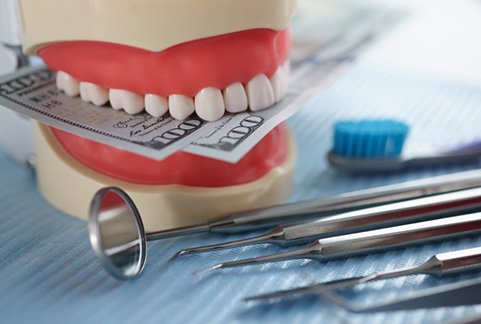
Overall, dental implants are more expensive than other restoration options, like dentures or bridges. However, dental implants are also the only restoration that can help prevent jawbone deterioration, making you significantly less likely to need bite alignment or jaw-related treatments down the road. They also last longer than alternatives, so you won’t have to spend as much money on replacements or adjustments. Dental implants are an investment that returns many cost-saving benefits!
Making Dental Implants Affordable

Dental insurance does not always cover the cost of dental implants, and when it does, it’s not usually for the full amount. Because of this, we’re proud to offer an alternative way to pay for your treatment through CareCredit financing.
With a CareCredit payment plan, you can break the total cost of your dental implants down into smaller, monthly chunks. Many of their options come with little-to-no interest, and their reliability as an organization is well-known. If you’d like to know more about CareCredit or would like help applying for a plan, let us know! We’ll be happy to help you make your treatment more affordable.
Dental Implant Technology

Our skilled dentists and support team do all we can to optimize the outcome of each treatment we perform. To do so, we combine our skills, experience, and education. But there is another element that plays a role in successful dental implant treatment: technology. We utilize advanced instruments to increase the accuracy and efficiency of the services we provide. Below, you will find an overview of a few of the pieces of technology that can help you in your journey to a restored smile.
Cone Beam Imaging/CBCT Scanner

Accurate treatment planning is extremely important, and it requires that we understand the state of your unique oral structures. In order for us to get an in-depth look at your oral anatomy, we will likely use our cone beam computed tomography (CBCT) scanner, also known simply as a cone beam scanner.
The CBCT machine is basically an advanced type of X-ray machine. It uses the same type of radiation as normal X-rays, but it is emitted in a cone-shaped beam. The machine is thus able to capture extremely detailed, three-dimensional images of your teeth, jaws, nerves, and connective tissues.
The images should be available in our computer system almost immediately after we capture them, and we can use them to plan exactly where to place your implants. After your implant surgery, we may recommend additional CBCT scans so we can monitor osseointegration (the process of the implants bonding with the surrounding bone) or diagnose any potential problems.
The scanning process is fast, non-invasive, and safe.
Digital Impression System
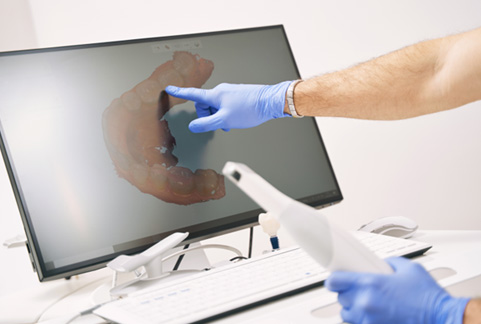
Some time after your dental implants are in place, you will need to get them restored with a crown, bridge, or denture. Your new teeth should fit harmoniously with your bite and provide you with both reliable strength and pleasing aesthetics.
To help us design your restoration, we will use our digital impression system. Instead of using messy and uncomfortable manual impression materials, all we have to do is move a small wand-like device around your mouth. It captures thousands of images and then assembles them into a highly detailed, impressively accurate digital impression of your teeth.
With the help of the scan, we can design your new teeth so they live up to our rigorous quality expectations.
Digital impressions tend to be more accurate, more comfortable, and even more ecofriendly than their old-fashioned manual counterparts. They are especially valuable for patients who want an efficient treatment process or who have a sensitive gag reflex.
Dental Implant FAQs
How Long Do Dental Implants Last?
Dental implants that receive proper care can last for thirty years or even a lifetime. The best ways to ensure that your restorations last for as long as possible are to maintain healthy oral and lifestyle habits such as brushing and flossing daily, using antibacterial mouthwash regularly, and refraining from smoking and excessive alcohol consumption. It’s also important to avoid using your teeth to open packages or bottles as well as chewing on ice or inedible objects or too vigorously on foods that are sticky, chewy, or hard. Implants deliver superior support for dental restorations, so they can often last several times longer than traditional bridges or dentures.
Does Getting Dental Implants Hurt?
The dental implant placement procedure always begins with our dentist administering an appropriate anesthetic to ensure that the patient feels no pain, and we may also perform a sedation treatment if they need extra help remaining calm, still, and comfortable. Since the jawbone has relatively few nerve endings, it has less potential for discomfort than other parts of the body in the first place. While placement surgery should be completely painless, you may experience some soreness for a few days afterward. This discomfort should be mild, temporary, and easy to manage with over-the-counter pain relievers or cold compresses. However, call the team at Dentistry for Life if you experience signs of infection such as fever, fatigue, chills, or a nasty taste in your mouth.
Are Dental Implants Safe?
Dental implants can be a safe and effective way to replace missing teeth for most patients with adequate oral health as long as they are placed by qualified professionals such as Drs. Herres and Votilla. While issues like gum disease and low jawbone density can preclude a patient from receiving implants, these issues can often be resolved with restorative treatments or bone grafts so implants can be placed later. If you have health conditions that can complicate the surgical or recovery process like pregnancy, diabetes, hemophilia, or cancer, please let us know during your consultation so we can plan your treatment appropriately.
How Successful Are Dental Implants?
Dental implants placed by skilled professionals such as Drs. Herres and Votilla enjoy a success rate of over 95% even ten years after being placed. However, the most important factor in how long your implants can last is how well you take care of them. It’s crucial to keep up with excellent oral hygiene and routine checkups at our Lancaster office while maintaining a healthy diet. Since the molars endure more pressure during the chewing process than the other teeth, implants replacing them may be more likely to fail sooner.
